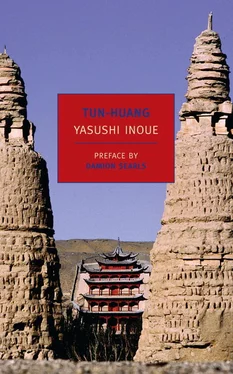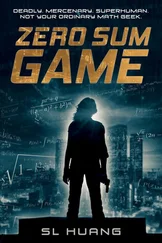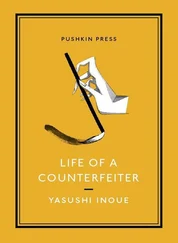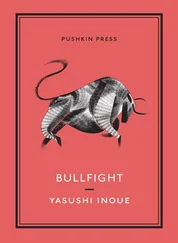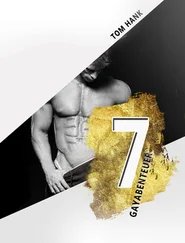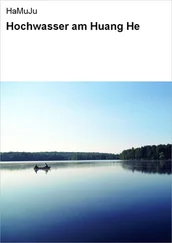Just as he had never asked Wang-li about his relationship with the girl, he also decided not to mention the necklace. Whether or not the necklace had belonged to the Uighur princess had no bearing on his own relationship with her.
About two weeks after he necklace incident, Kuang unexpectedly came to Hsing-te’s quarters. After returning to Hsing-ch’ing, Kuang had stopped in Kua-chou for only two or three days, then left for Sha-chou, and there had been no word from him for a year.
It was evening when Kuang arrived. As the sun had set, a chill spread in the room. As usual, Kuang had his bold expression and his eyes flashed. He sat in the chair Hsing-te offered him, and with a rather strong preamble to the effect that he would not leave without learning what he had come for, Kuang asked, “Where did you get that necklace? I know good jewelry. Those stones are not common. In Khotan they’re called moonstones. I’ve handled all sorts of gems till now, but I have never seen such priceless stones. I’m not saying that I want yours. I think you should keep it. I just want to have the other one.”
Hsing-te unconsciously raised his voice. “What do you mean, the other one?”
“There should be another one. Tell me where it is. I’ll get it. I’ve always got what I’ve gone after. That necklace is one of a pair. Who has the other?”
“I don’t know.”
To this Kuang answered, “Of course you know. Someone owned your necklace before you. Come on, tell me who!”
“I don’t know.”
“What do you mean, you don’t know!” Kuang started to rant at him and then quickly changed his mind. “Don’t say such unfriendly things. We traveled to and from Hsing-ch’ing together, didn’t we? We’re like brothers.…”
“I don’t know.”
“Well then, how did you get that necklace? Did you steal it?”
“I don’t know.”
Kuang’s face twitched with anger. “Don’t try to make a fool of me. Don’t you see that it’s Kuang being so humble with you?” The young man rose and looked furtively around as if he were planning to assault Hsing-te again.
“What I don’t know, I just don’t know.”
“All right, then. Give me the one you have.”
With a look of exasperation, Kuang seized him. But he seemed to change his mind again at this point. He could take it away from Hsing-te at any time. Letting Hsing-te keep it would be like having the necklace deposited in a convenient, safe place. Besides, it would definitely be better to have two strands rather than one. Kuang’s expression softened and he said, “You should store such valuable gems in a safe place. It’s best for you to keep yours. I’ll get the other. Such a necklace should anyway belong to me, as descendant of the Khotan royal family. I’m going to Liang-chou again. Think it over while I’m gone.”
After this, Kuang left the room, darkening in the dusk, for the cold outdoors.
Kuang, who said he was leaving for Liang-chou, reappeared at Hsing-te’s lodgings after about twenty days. According to him, in July the Hsi-hsia leader, Yüan-hao, had finally crossed the Chinese borders and had attacked, plundering private houses on the way and leaving a path of devastation as far as Ch’ing-chou. Now he had pulled back to Hsing-ch’ing. Meanwhile, the Wu-liang territory east of Kan-chou was in utter chaos because of the anticipated attack of the Chinese army and the continued presence of the Turfans. Only Kua-chou, ignorant of the situation, remained carefree. Actually, in the deserts, grass plains and plateaus east of Kan-chou, there were daily skirmishes between the Hsi-hsia and the Turfans, who were now moving about erratically. Even Kuang did not dare venture east of Kan-chou.
When he had finaished, Kuang asked, “Have you thought it over about the necklace? Just who did you get it from?” Again, the same question.
“I don’t know.” Again, the same answer.
Kuang threatened, shouted, placated Hsing-te, and finally, seeing that his efforts were fruitless, calmed down as he had before, and asked Hsing-te to think about it. Then he left. This time Kuang took a caravan to Qoco.
In January 1035, Wang-li’s unit received orders to leave. The Hsi-hsia army was to invade Ch’ing-t’ang, Chüeh-ssu-lo’s base, in order to subjugate the Turfans, and Wang-li’s troops were to be the vanguard in this campaign. Before all-out war with China, the Hsi-hsia planned to launch a full-scale attack on the Turfans and to destroy them at one blow.
Hsing-te was summoned by Wang-li. When he arrived, Wang-li abruptly asked, “Do you want to go?”
“Naturally I’ll go,” Hsing-te replied.
“You might not return.”
“I don’t care.”
Hsing-te had no fear of death. The only thing he regretted was that his translation of the Diamond Sutra into Hsi-hsia was not yet completed, but that couldn’t be helped. If he survived and returned, he could probably resume that work. The prospect of risking his life again on the battlefield after such a long lapse made Hsing-te tense with excitement.
However, a few days later, in the midst of the hubbub of departure preparations, Hsing-te was summoned to see Wang-li again.
“I think it’s best that you remain here and continue your work. You stay here with five hundred troops and guard the city,” Wang-li ordered. As Hsing-te tried to reply, Wang-li said severely, “These are orders. Don’t answer back.” He then gave Hsing-te detailed instructions on deploying the defense troops.
On the day that Wang-li and his four and a half thousand men left Kua-chou, a terrible storm blew up. Fierce winds hurled the snow against the age-old walls. The long line of camels and horses left from Capital Gate and headed east. Soon they disappeared into the blizzard. For a long time after their departure into the gray world, Hsing-te kept his troops, who had seen the men off, standing at attention beside the gate.
Kua-chou suddenly seemed empty and terribly quiet. The blizzard which had swallowed up Wang-li’s troops raged for three days and nights. Hsing-te suddenly became very busy. He couldn’t go every day to the translation wing of Yen-hui’s palace as before. He could only make sure that the sutra translations continued steadily, though at a snail’s pace; then he would return to the barracks to make his rounds in order to keep up morale. Also, since Hsing-te had no experience as a commander in the front lines, he had to train himself first.
The small marauding units of Turfans and the constant clashes that had taken place while Wang-li was there suddenly ceased as though prearranged as soon as Wang-li left. Perhaps the Turfan troops, including the small units in this area, had also been thrown into the major battle arena to the east.
It was around the end of June, about half a year after Wang-li had left, that the first news from the east was relayed to Kua-chou. Three stalwart Chinese soldiers carried the first message from Wang-li. It appeared that Wang-li had dictated it to someone, and it was a short, concise message in Hsi-hsia.
“Yüan-hao personally led his troops and besieged Maonin city for a month. The enemy would not surrender. He made a false truce and had the enemy open the gates, then wantonly slaughtered them. Our casualties were five hundred men. Tomorrow morning we set off to invade Chüeh-ssu-lo’s main base, Ch’ing-t’ang.” The five hundred casualties in the message seemed to be Wang-li’s men.
About a month and a half later, in mid-August, a second message from Wang-li arrived. This was also a report on the battle conditions, but this time the note was written in Chinese.
“The main army attacked Ch’ing-t’ang. Other forces are fighting in An-erh on the Tsung River, and at various fronts. An-tzu-lo, Chüeh-ssu-lo’s deputy general, has cut off the main army’s retreat. Our unit has been fighting day and night for over a month in the invasion of the Tai-hsing mountains. Our casualties have reached three thousand.”
Читать дальше
